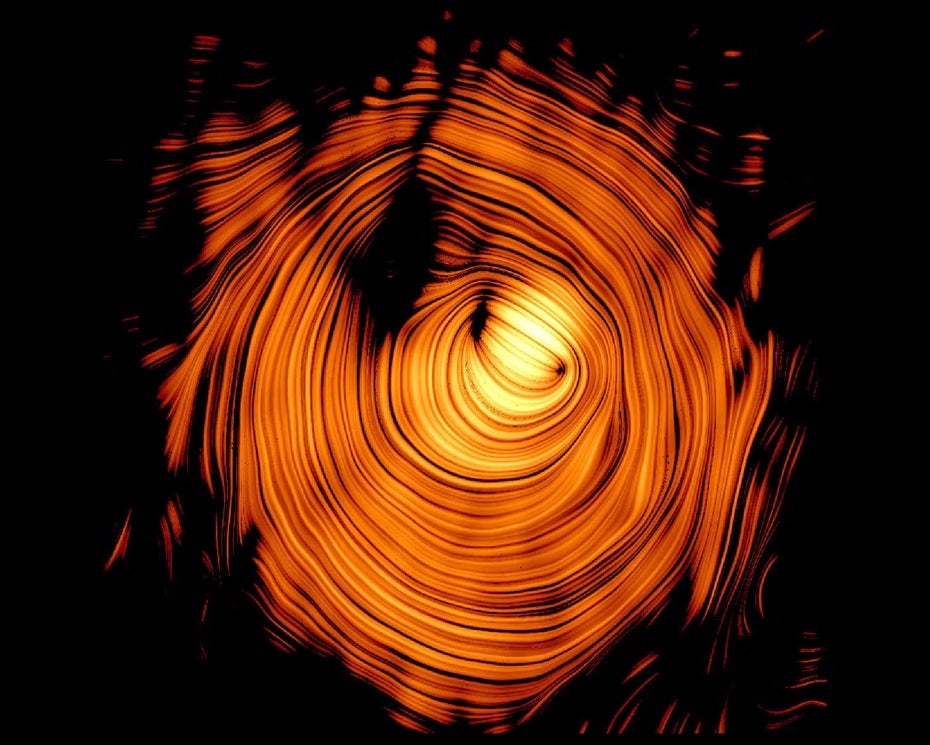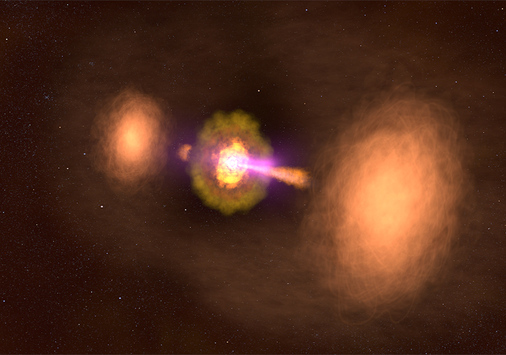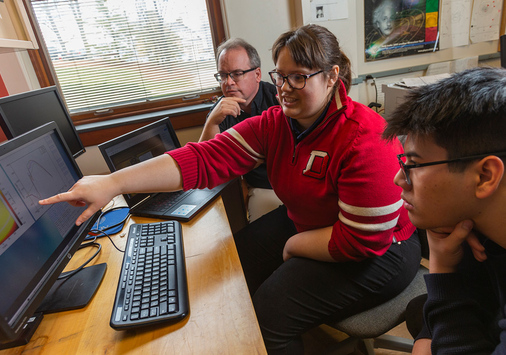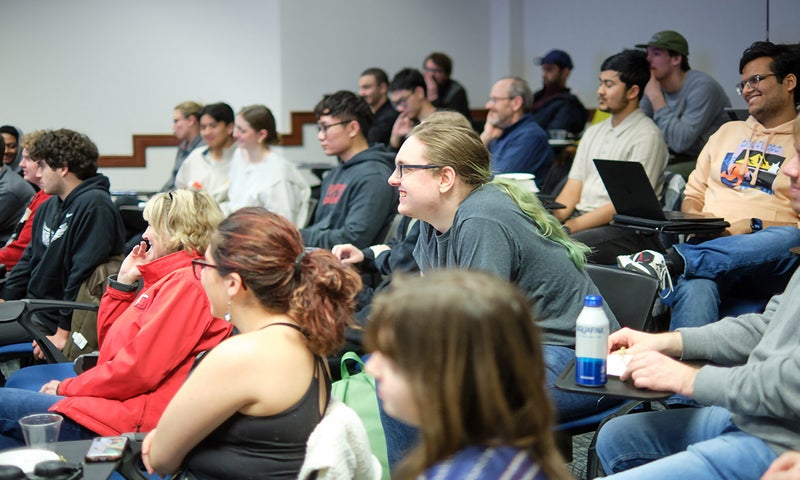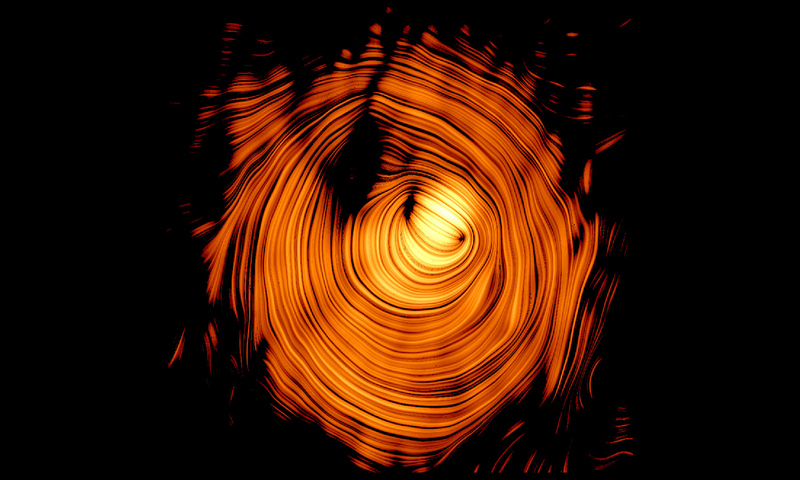Courses
2025 - 2026
For this academic year's course catalog, please visit our Academic Catalog site. For courses currently offered, please refer to the Schedule of Classes.
An introductory course in astronomy, intended for any student who wishes to better understand the nature of the universe. Topics may include the history of astronomy, naked eye observations, the planets and moons, the origin of the solar system, stellar classification, stellar evolution, galactic astronomy, and cosmology. Class and laboratory work will explore the physical and observational background for these topics with an emphasis on the quantitative nature of modern astronomy. Three classroom hours and one two-hour laboratory each week. This course satisfies the quantitative reasoning general education requirement. No previous training in physics is expected; mathematical preparation is assumed to include high school algebra and trigonometry.
A course that introduces students to topics that are at the current frontiers of physics and astronomy, and helps students develop quantitative reasoning and analytical skills necessary for further study in these fields. Topics typically include special relativity, waves and interference, quantization of light and energy, the hydrogen atom, nuclear structure, radioactivity, and cosmology. This course satisfies the quantitative reasoning requirement. Three lectures and one three-hour laboratory per week.
Prerequisite(s): MATH 130 or MATH 135 or MATH 145 or concurrent.
Crosslisting: PHYS 125.
A general category used only in the evaluation of transfer credit.
A general category used only in the evaluation of transfer credit.
This course is designed to teach students to build and use physical models to understand a variety of astronomical systems. Students will apply key concepts from modern and classical physics in an astronomical context, including gravity, light, relativity, thermodynamics, nuclear physics, and the interactions of light and matter. They will first develop models for stellar systems, and then explore other astrophysical topics, such as supernovae, general relativity and black holes, the structure of our galaxy, active galactic nuclei, and cosmology.
Prerequisite(s): ASTR 100, ASTR 125 or PHYS 125, PHYS 122 or PHYS 127.
An advanced lab course focused on experimental design and techniques, applying statistical principles to analyze and interpret data, and communicating scientific results through writing. May be repeated once for credit as either PHYS 312 or ASTR 312.
Prerequisite(s): PHYS 122 or PHYS 127, PHYS 200 recommended.
Crosslisting: PHYS 312.
A student in good standing may work intensively in areas of special interest under the Directed Study plan. A Directed Study is appropriate when, under the guidance of a faculty member, a student wants to explore a subject more fully than is possible in a regular course or to study a subject not covered in the regular curriculum. A Directed Study should not normally duplicate a course that is regularly offered. Directed Studies are normally taken for 3 or 4 credits. A one-semester Directed Study is limited to a maximum of 4 credit hours. Note: Directed Studies may not be used to fulfill General Education requirements.
Prerequisite(s): Consent of chairperson.
A student in good standing may work intensively in areas of special interest under the Directed Study plan. A Directed Study is appropriate when, under the guidance of a faculty member, a student wants to explore a subject more fully than is possible in a regular course or to study a subject not covered in the regular curriculum. A Directed Study should not normally duplicate a course that is regularly offered. Directed Studies are normally taken for 3 or 4 credits. A one-semester Directed Study is limited to a maximum of 4 credit hours. Note: Directed Studies may not be used to fulfill General Education requirements.
Prerequisite(s): Consent of chairperson.
Independent Study engages a student in the pursuit of clearly defined goals. In this effort a student may employ skills and information developed in previous course experiences or may develop some mastery of new knowledge or skills. A proposal for an Independent Study project must be approved in advance by the faculty member who agrees to serve as the project advisor. Note: Independent Studies may not be used to fulfill General Education requirements.
Independent Study engages a student in the pursuit of clearly defined goals. In this effort a student may employ skills and information developed in previous course experiences or may develop some mastery of new knowledge or skills. A proposal for an Independent Study project must be approved in advance by the faculty member who agrees to serve as the project advisor. Note: Independent Studies may not be used to fulfill General Education requirements.
A general category used only in the evaluation of transfer credit.
Students may enroll in Senior Research in their final year at Denison. Normally, Senior Research requires a major thesis, report, or project in the student's field of concentration and carries eight semester-hours of credit for the year. Typically, a final grade for a year-long Senior Research will not be assigned until the completion of the year-long Senior Research at the end of the second semester. Each semester of Senior Research is limited to a maximum of 4 credit hours. Note: Senior Research may not be used to fulfill General Education requirements.
Prerequisite(s): Prior consent of the instructor (faculty member advising the research) and the Department Chair required.
Students may enroll in Senior Research in their final year at Denison. Normally, Senior Research requires a major thesis, report, or project in the student's field of concentration and carries eight semester-hours of credit for the year. Typically, a final grade for a year-long Senior Research will not be assigned until the completion of the year-long Senior Research at the end of the second semester. Each semester of Senior Research is limited to a maximum of 4 credit hours. Note: Senior Research may not be used to fulfill General Education requirements.
Prerequisite(s): PHYS 312 and prior consent of the instructor (faculty member advising the research) and the Department Chair are required.
